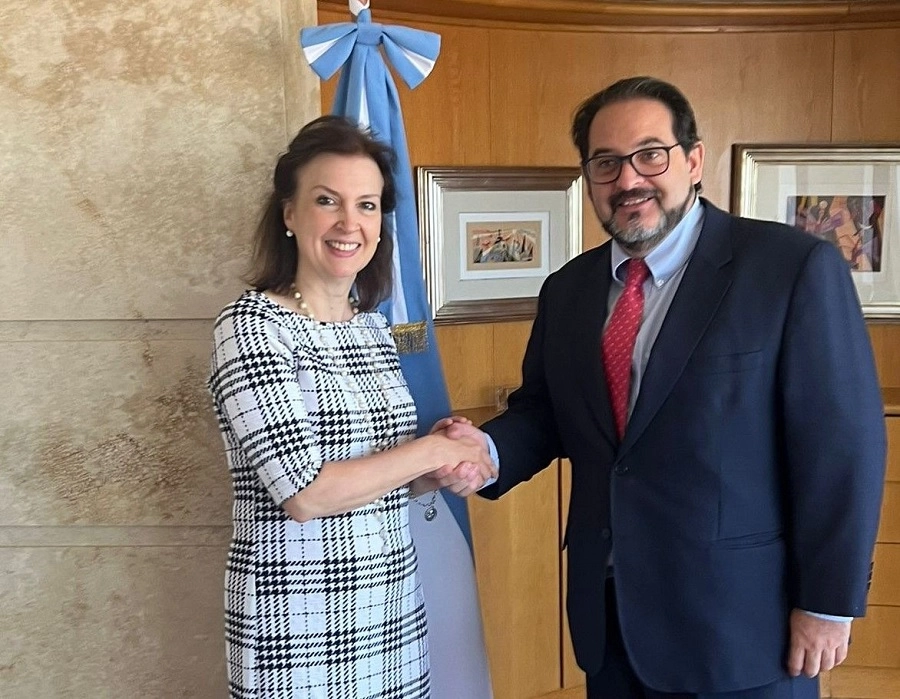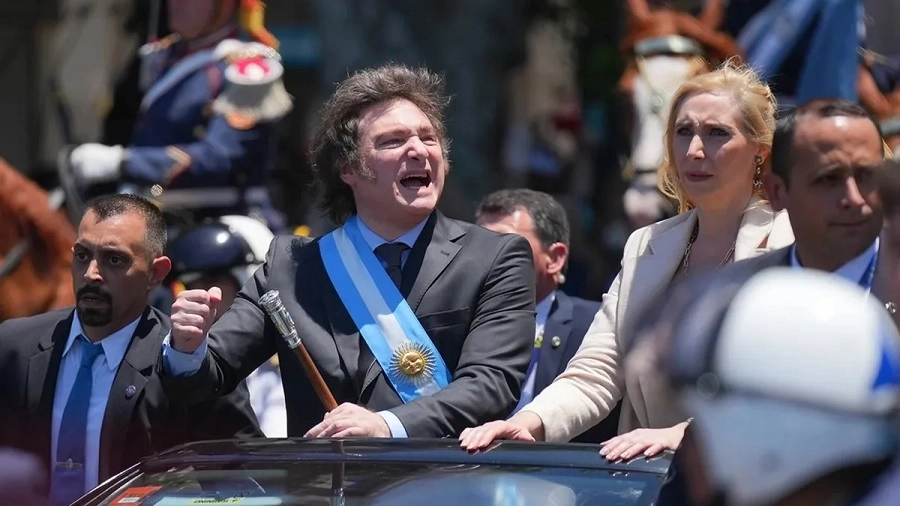Since December 10th, Javier Milei is the new president of the Argentine Republic.
The main comments that resonated in his campaign were the denial of climate change, YPF’s privatization, the hydrocarbon’s role, and the lithium market.
Within that equation, the course of the country’s energy landscape experiences great uncertainty: the lack of announcements and policies regarding electric vehicles and environmental sustainability have left in suspense what its future projections are.
It is worth noting that the leader of Freedom Advances aims to promote a government agenda of structural transformation, with the goal of making Argentina a world power again in 30 years.
In this note from Mobility Portal Latinoamérica, we bring a point-by-point analysis of the different actors in the value chain.
Which ministry could end up regulating energy measures?
One of the highlights of Milei’s early days in office was the cabinet reshuffle, which included a reduction in ministries and the creation of new ones.
Thus, Argentina now has nine ministries: Ministry of the Interior, Ministry of Foreign Affairs, Ministry of International Trade and Worship, Ministry of Defense, Ministry of Economy, Ministry of Infrastructure, Ministry of Justice, Ministry of Security, Ministry of Health, and Ministry of Human Capital.
While there has not been a specific plan presented so far to address electromobility, in terms of energy policy, the new government aims for greater private sector initiative, less state intervention, and free-market prices.

However, it’s worth noting that, one day after taking office, Chancellor Diana Mondino met with the Executive Secretary of the Latin American Energy Organization (OLADE), Andrés Rebolledo, to discuss issues related to the energy transition.
In this line, the Ministry of Economy and the Ministry of Infrastructure will be crucial for the administration.
Initially, it had been outlined that Guillermo Ferraro, Minister of Infrastructure, would be in charge of five crucial areas: Transportation, Public Works, Mining, Energy, and Communications.
However, in the last hours, it was revealed that Energy and Mining will be part of the Ministry of Economy, led by Luis Caputo.
The government justified this decision as part of an effort to refine subsidy and tariff policies.
Nevertheless, they emphasized that projects related to energy and mining will continue to be supervised by the Ministry of Infrastructure.
Meanwhile, the Ministry of Infrastructure is focused on everything related to the development of policies on public works and infrastructure, as well as air, rail, road, river, and maritime transport, among other aspects.
According to the details in the official state announce published on December 11, there is no specific point addressing electric mobility, raising questions about the government’s focus on this crucial area for environmental sustainability.
What does the energy plan say?
The Ministry of Energy will be led by Eduardo Rodríguez Chirillo, who expressed his conviction to free the energy market with a transition period to “cushion the impact on the end consumer.”
In addition, in his recent statements at the Club del Petróleo, a space that brings together leaders of the private sector in the hydrocarbon industry, he made clear his wish to obtain financing from Development Banks for the private sector to “carry out the most immediate energy infrastructure works.”
Chirillo is a lawyer and founding partner of the international consultancy ERC, specialized in electricity, renewable energy, gas, and oil, and was a consultant in the 90s for the Ministry of Energy.
In an interview, Chirillo stated that his intention is “to try to create competitive markets and give freedom to consumers and companies, where the state tries to make the rules as stable as possible and respected.”
The energy plan presented by the Secretary of Energy is part of a comprehensive reform and focuses on rates, privatization of companies, investments, Vaca Muerta, the unification of regulatory entities, and the restructuring of YPF.
With Milei’s assumption, YPF enters a new stage. First, there is talk of a restructuring led by Horacio Marín, former president of Tecpetrol, with extensive experience in the hydrocarbon sector.
Marín would seek the professionalization of management, optimization of the company’s business, and industrial valorization of the hydrocarbon value chain.
More specifically, Chirillo has three short-term objectives: “Ensure the supply conditions of electricity, gas, and fuels; recover the institutional framework of sector organizations and restore market mechanisms with state intervention limited to controlling dominant positions and ensuring freedom and competition among companies.
Who will invest in lithium in Argentina?
Regarding the Secretary of Mining, a central area in the coming years due to the lithium boom, there are still no clear definitions.
It is noteworthy that Argentina is the fourth-largest lithium producer globally and shares the world’s largest reserves with Bolivia and Chile.
Regarding the dialogue that Milei had with the International Monetary Fund, Juan Gonzalez, an advisor to U.S. President Joe Biden and director of the Western Hemisphere at the National Security Council, told Reuters that the United States will support Argentina in advancing the lithium value chain.
Another uncertainty regarding the future of lithium revolves around statements made by Javier Milei during his presidential campaign.
The current president expressed his desire to end relations with China and Brazil because they are ‘communist countries.’
“Commercial relations are a matter for private individuals, and the state should not interfere. Mercosur doesn’t work, and if China does not buy from us, we can use triangulation to reach those markets,” he said.
In response, former Secretary of Mining Fernanda Ávila warned that “in the first nine months of 2023, China and Brazil imported $293 million worth of Argentine minerals. Breaking these ties would not only be enormous for the industry, but also for the entire productive chain associated with the sector.”
The data is clear. China is the main destination for Argentine lithium, representing 38% of the country’s lithium exports.
Brazil is Argentina’s main trading partner, especially in the automotive industry.
What is the current state of electromobility in Argentina?
Throughout the last couple of years, Argentina has gone through various legal and regulatory frameworks regarding electric mobility.
It could be said that, in 2023, the country is characterized by the absence of electric mobility legislation. A brief overview:
In October 2021, Matías Kulfas, former Minister of Productive Development in Alberto Fernández’s government, presented the Sustainable Mobility Promotion Law project, which aimed to transform the automotive industry and lead the shift towards the use of renewable energy.
The project, developed by the Ministry of Productive Development of the Nation and submitted to the Economic and Social Council (CES), declared the design, development, and manufacture of alternative energy-powered means of mobility as “of national and strategic interest.”
It also aimed at the reconversion and use of sustainable, nationally produced vehicles. The project proposed a series of tax benefits to stimulate demand and encourage significant investment in the automotive industry.
However, this project did not gain follow-up and lost its parliamentary status.
In September 2022, the Automotive Industry Promotion Law was sanctioned, providing tax benefits such as the exemption from export duties until December 31, 2031.
Among its objectives, it seeks to promote an export-oriented profile with better international integration, encourage the development and transfer of new technologies, and boost new engines with hybrid, electric, hydrogen, gas, and biofuel technologies, among other types of engines.
Finally, in May 2023, Alberto Fernández’s government presented the National Production Promotion Law for Electric and Hybrid Vehicles.
The proposal aimed to progress in the development of the electroparts sector and the promotion of the production of personal mobility vehicles, along with the regulation of technologies for converting conventional vehicles to electric.
In the absence of concrete statements about the future of these laws, the persistent questions are: How will these policies adapt or change under the Milei administration? What direction will the country take in terms of energy during his term?






